NIL
NCAA president opens the door for Trump to weigh in on NIL rules
The head of the National Collegiate Athletic Association is welcoming the possibility of Donald Trump and the executive branch weighing in on the name, image and likeness rules for college athletes. Last week, I wrote about former college football coach Nick Saban’s meeting with Trump, in which he’s said to have urged Trump to take […]
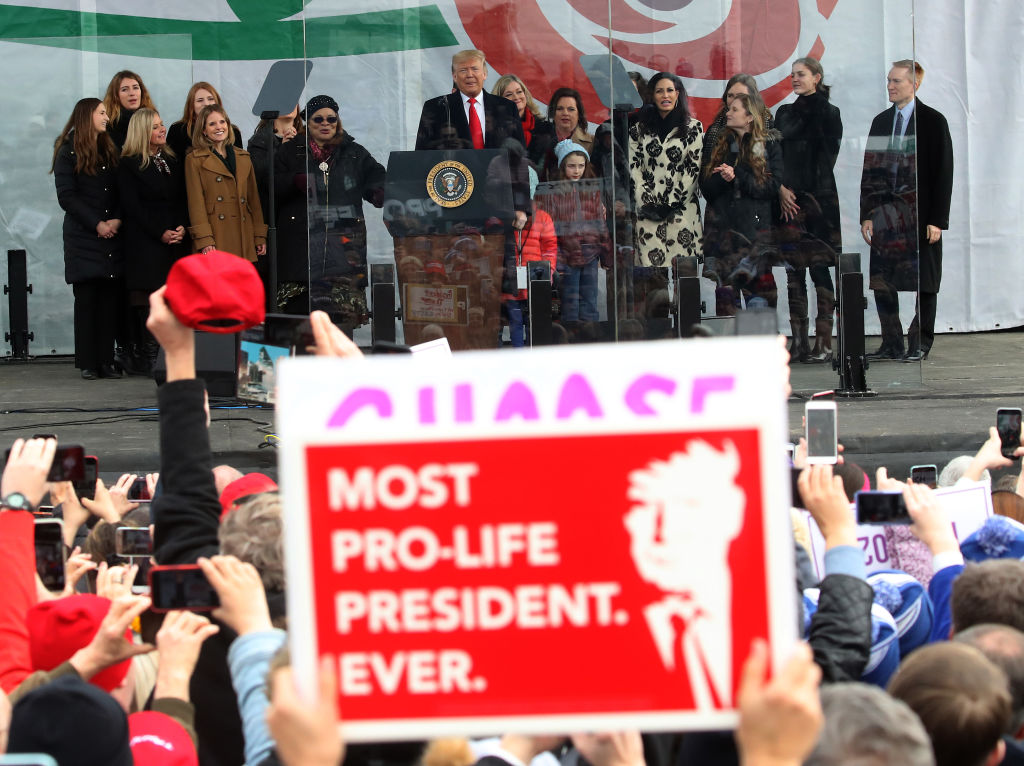


The head of the National Collegiate Athletic Association is welcoming the possibility of Donald Trump and the executive branch weighing in on the name, image and likeness rules for college athletes.
Last week, I wrote about former college football coach Nick Saban’s meeting with Trump, in which he’s said to have urged Trump to take executive action to control the system that currently allows college athletes to earn money from their name, image and likeness (NIL). Saban has previously suggested today’s college athletes are too entitled, and he’s found an ally in Republican Sen. Tommy Tuberville of Alabama, who’s also a former college football coach who has complained about the current system. It’s a pairing that raises doubts that any solution they propose will favor players rather than the colleges that rely on their labor. More recent news reports indicate that Trump is considering naming Saban and a billionaire Texas Tech booster to a commission on college athletics that could include NIL rules.
During a gathering on Monday, NCAA President Charlie Baker expressed openness to government involvement. According to The News & Observer of Raleigh, N.C.:
‘I think the fact that there’s an interest on the executive side on this, I think it speaks to the fact that everybody is paying a lot of attention right now to what’s going on in college sports,’ said Baker, a former Republican governor of Massachusetts. ‘There is a lot going on, that’s not all bad, and I’m up for anything that helps us get somewhere.’
On whether Trump or his commission’s involvement would bring about the NIL legislation that some NCAA officials have been seeking for years, Baker said, “I don’t have a crystal ball on that one, I don’t know.” He added, “We do need some help at some point to create some clarity out of some of these issues in Washington. Creating clarity one lawsuit at a time is just a really bad way to try to move forward.”
So it looks like the NCAA is taking a different approach to Trump’s potential meddling in their institution. Where some organizations, like a handful of law firms, have resisted Trump’s edicts that attempt to dictate how they operate, the NCAA is “up for anything.”
This article was originally published on MSNBC.com
NIL
College quarterbacks turning NIL earnings into venture capital investments
Credit: Jeremy Reper-Imagn Images College athletes are channeling their NIL earnings into venture capital investments. Front Office Sports reports that three college quarterbacks — including a potential top-five pick — are putting their money into VC-backed start-ups. South Carolina’s LaNorris Sellers — projected as one of the top signal-callers in the 2026 NFL Draft — […]
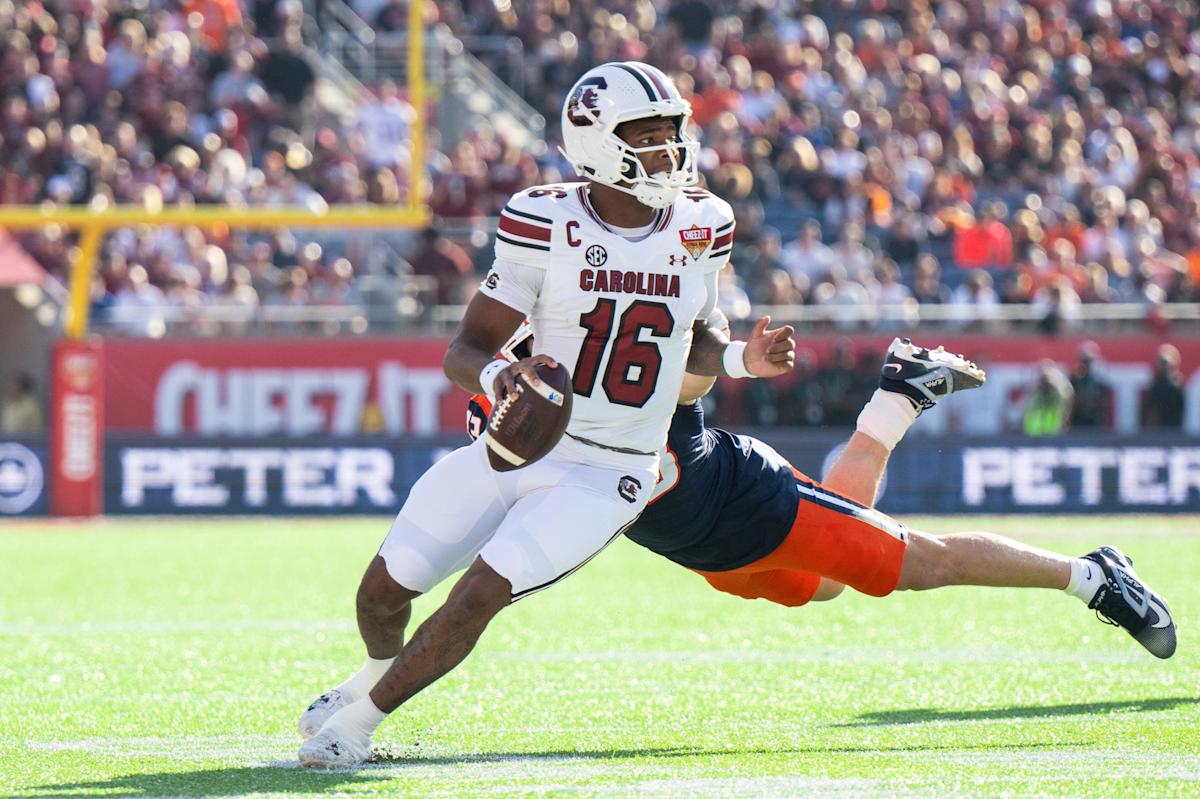
College athletes are channeling their NIL earnings into venture capital investments. Front Office Sports reports that three college quarterbacks — including a potential top-five pick — are putting their money into VC-backed start-ups.
South Carolina’s LaNorris Sellers — projected as one of the top signal-callers in the 2026 NFL Draft — Southern Methodist University’s Kevin Jennings and Kansas State University’s Avery Johnson have invested in The Cashmere Fund. According to Front Office Sports, the fund is a “Nasdaq-listed venture capital fund that allows non-accredited investors to invest in VC-backed start-ups.”
Buffalo Bills players Josh Allen and Damar Hamlin are also investors.
“There was some business savvy in all of them,” Elia Infascelli, CEO of Cashmere, told Front Office Sports. “Avery Johnson is a business major, for example. They didn’t need to do this, but they wanted to.
“They are investors in the fund just like any other person would invest in the fund.”
Cashmere is working with college athletes to bring more attention to their fund and attract additional investors.
“At 18, 19, or 21, to think about long-term relationships and invest without any immediate upside today, that’s rare,” Infascelli explained.
NIL has created new opportunities for college athletes. For those who won’t turn pro, these ventures offer a path to financial stability beyond their college careers.
Related Headlines
NIL
Green Adds Five to 2025 Fall Softball Roster
Story Links CONWAY, S.C. – Coastal Carolina softball head coach Kelley Green announced the addition of five transfer student-athletes to the 2025 fall roster on Thursday afternoon. Joining the Chanticleers are graduate students Savannah Jones and Kaelin Cash, senior Mackenzie Childers, junior Hannah Bendle, and sophomore Reagan Troy. The group will […]
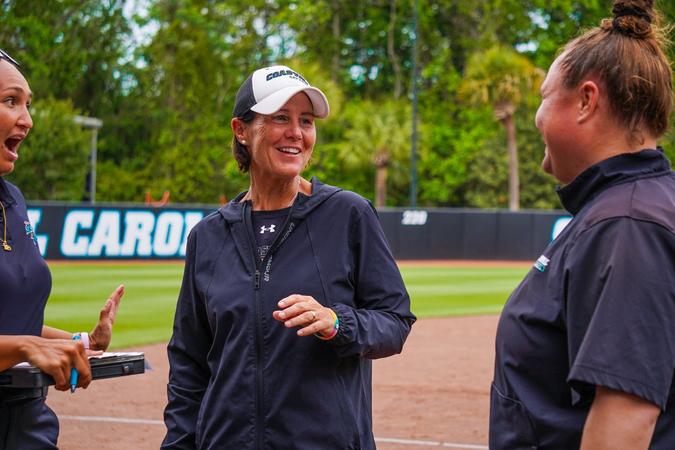
CONWAY, S.C. – Coastal Carolina softball head coach Kelley Green announced the addition of five transfer student-athletes to the 2025 fall roster on Thursday afternoon.
Joining the Chanticleers are graduate students Savannah Jones and Kaelin Cash, senior Mackenzie Childers, junior Hannah Bendle, and sophomore Reagan Troy. The group will be joined by six incoming freshmen, Bailey Huff, Leah Kendall, Georgia Moss, Izzy Ramirez, Kelsey Sawvell, and Sara Zink, who signed with Coastal during National Signing Day on Nov. 13.
Savannah Jones
A four-year transfer from Bucknell University, Jones made her mark in the Patriot League earning All-Conference first team honors in 2024, along with second team recognition in 2023 and 2025. The Danville, Ind., native had a stellar senior season picking up three Pitcher of the Week selections while being named to the Patriot League All-Tournament team. In addition to her dominance in the circle, she contributed at the plate with a .253 batting average, tallying 96 hits, 45 runs, and 63 RBIs, and a .310 on-base percentage.
Green on Jones: “Savannah does a great job keeping hitters off-balance with her elite level change up and ability to pepper the corners.”
Hannah Bendle
Bendle joins the beach after two successful seasons at Saint Francis, where she earned All-Northeast Conference honors and was recognized as an NEC Prime Performer. A native of New Concord, Ohio, she posted a .299 batting average over 83 career games with the Hawks, collecting six home runs, 35 RBIs, and 49 hits. Prior to her collegiate career, Bendle was a highly decorated high school athlete, earning two first team all-state selections, three first team all-district nods, and two MVL Player of the Year awards.
Green on Bendle: “Hannah is an athletic middle infielder with a strong lefty bat and is always a tough out in the box.”
Kaelin Cash
Cash began her collegiate career at Saint Joseph’s, where she earned Atlantic 10 All-Rookie Team honors in 2022, followed by first team All-Conference recognition and a Player of the Week nod in 2023. During her standout sophomore season, she ranked third in program history for single-season home runs with 12 and led the conference in both slugging percentage and OPS. The Greenwood, Ind., native transferred to Michigan State in 2024 where she was an All-Big Ten second team selection and an NFCA All-Region second team selection during her senior year.
Coach Green on Cash: “Kaelin is a big-time player with a power bat and will be a great addition to our lineup.”
Reagan Troy
A four-year letterman at Broad Run High School, Troy was ranked the No. 31 prospect in the Class of 2024 by Extra Innings Softball. In 2023, she earned All-Dulles District first team honors and was named to the all-region second team. She also picked up Rookie of the Year honors in 2021. Over her high school career, she recorded an impressive 173 strikeouts across 129.1 innings pitched.
Coach Green on Troy: “We are excited to have Reagan in Teal. She has all the tools and drive to be an elite pitcher in the Sun Belt and beyond.”
Mackenzie Childers
A senior from North Texas University, Childers made a name for herself in the circle as a two-time American Athletic Conference (AAC) Pitcher of the Week and an ACC Weekly Honor Roll honoree during her sophomore season. The Little Rock, Ark., native tallied 12 career wins, posting a 3.82 ERA across 54 appearances and 23 starts. Over 141.0 innings of work, she struck out 164 batters and held opponents to a .203 batting average.
Coach Green on Childers: “Mackenzie is a power pitcher with a history of success against elite hitters and will be an integral part of our pitching staff.”
For complete coverage of CCU softball, follow the Chanticleers on social media at @CoastalSoftball (X), @GoCCUSports (Instagram), and facebook.com/CCUChanticleers (Facebook) or visit the official home of Coastal Carolina Athletics at goccusports.com.
NIL
Why college basketball’s schedule expansion could spell bad news for some programs
According to recent reports, the number of regular-season games that college basketball programs can schedule will increase from 31 to 32. This increase is not a requirement but allows programs an additional scheduling slot and flexibility. This move is not a major change and shouldn’t greatly affect the sport, but was it a good move […]
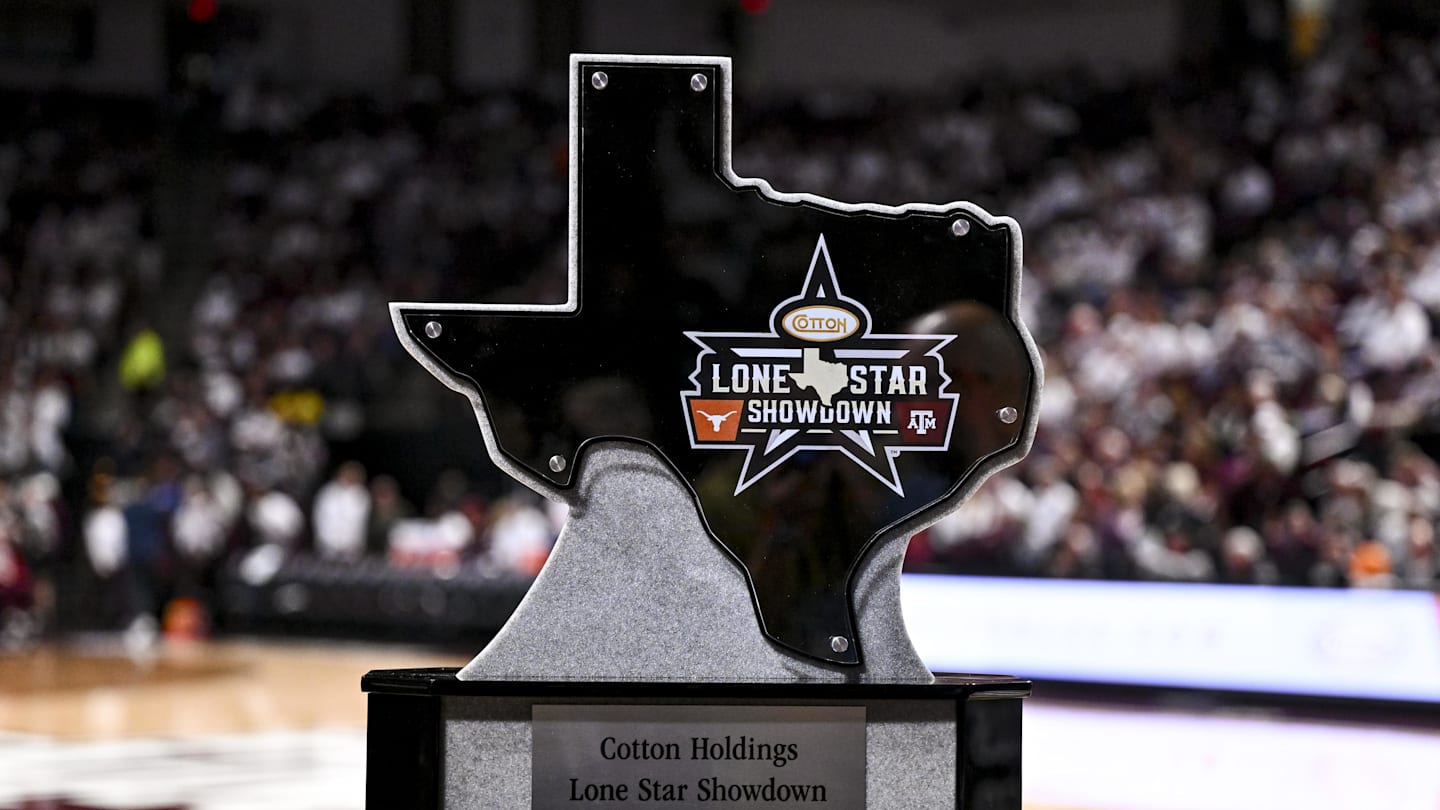
According to recent reports, the number of regular-season games that college basketball programs can schedule will increase from 31 to 32. This increase is not a requirement but allows programs an additional scheduling slot and flexibility. This move is not a major change and shouldn’t greatly affect the sport, but was it a good move or a bad move?
If you’re members of a league like the Big Ten or SEC then it’s definitely good news for you and your program. Those leagues have competitive 20-game league schedules which don’t leave a ton of room in nonconference. When you throw in holiday tournaments, conference challenges, and other rivalry matchups, you may have some of those teams with only 5 or 6 games left on their schedule. This addition gives them another opportunity to build their resumes and fit other exciting games on the docket.
You can easily look at this addition with an optimistic eye for the rest of the college basketball universe. A glaring example is in the ACC, a bona fide power conference that really struggled last season. NCAA Tournament teams like Duke, Clemson, and Louisville had to play more than a dozen games each against league members who were really struggling and certainly could have used an extra game to play a stronger opponent.
However, this move seems just like another power conference power grab that will have significant downsides for mid-major programs. Consider the current state of scheduling for those leagues. Prominent mid-majors aren’t getting games against power conference teams that will actually help their resumes and adding just another open slot isn’t going to change that. Do you really think that with an extra game on the schedule that the Alabama’s or North Carolina’s of the world are really going to want to play an upstart mid-major like Chattanooga or High Point?
It’s important to remember that this 32nd game is not required. It’s very likely that if it was it would lead to a great number of games against non-D1 opponents, something that already litters the schedules of a majority of low-major programs. One hope is that this extra opportunity could help create new conference challenges or other regular matchups but agreeing to these types of things is a two-way street.
When March rolls around after this change goes into place, you’ll have those ACC, Big Ten, and SEC teams with even more meat on their resumes while the mid-majors are placed even further behind the 8-ball. You could argue whatever you wanted about how additional opportunities are great for this sport and you wouldn’t be wrong, but remember what teams like Oral Roberts, Princeton and Saint Peter’s have done in recent years.
None of those three programs are in the same shape as their recent NCAA Tournament runs but you’d be hard-pressed to find a power conference program that would have wanted to play any of them at their peak, even at home. There’s no upside in playing these great mid-majors. That 32nd game for Duke or Kentucky likely becomes part of a tournament or a neutral-site game against another major team. That 32nd game for North Carolina Central or Northern Kentucky either doesn’t happen or isn’t exactly a highlight of the season.
In the end, this extra game is a relative good but it’s not as great of news as it initially seems. It’s a reminder that building a great schedule in college basketball continues to be a losing battle for strong mid-major programs. An extra chance to see star players will be fantastic but don’t get your hopes up for your favorite school to suddenly have a trip to Durham on the docket.
NIL
Miami Heat draft Illini guard Kasparas Jakucionis with No. 20 pick in 2025 NBA Draft
The Miami Heat drafted Illinois freshman guard Kasparas Jakucionis with the No. 20 overall pick in the 2025 NBA Draft on Wednesday. One of the top international prospects in the world, Jakucionis earned Third Team All-Big Ten and Big Ten All-Freshman for Illinois this season after averaging 15.0 points, 5.7 rebounds and 4.7 assists while shooting 44.0% from the field […]
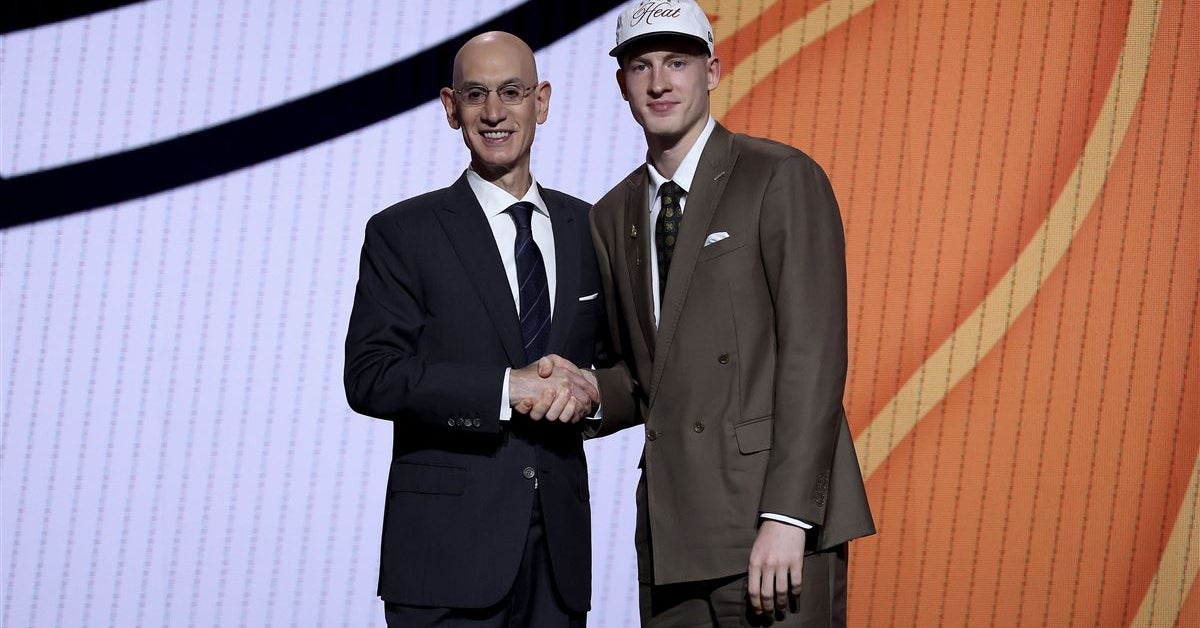
The Miami Heat drafted Illinois freshman guard Kasparas Jakucionis with the No. 20 overall pick in the 2025 NBA Draft on Wednesday.
One of the top international prospects in the world, Jakucionis earned Third Team All-Big Ten and Big Ten All-Freshman for Illinois this season after averaging 15.0 points, 5.7 rebounds and 4.7 assists while shooting 44.0% from the field and 31.8% from three.
Jakucionis, who just celebrated his 19th birthday in late May, started the season on a tear before a midseason wrist injury and late-season slump.
The 6-foot-6 guard from Lithuania averaged 16.7 points on 50% shooting (41.6%) three to go along with 5.4 rebounds and 5.4 assists during his first 15 games to lead Illinois to a 12-3 start. Jakucionis then suffered a wrist injury and missed two games but had five 17+ point performances in an eight-game stretch to seemingly bounce back. But Jakucionis struggled in his final nine games at Illinois, averaging 12.2 points on 36% shooting (25% three) with more turnovers (38) than assists (26).
Still, Jakucionis had one of the most productive freshmen seasons in Illinois history. He set the Illinois freshman record for 20+ point games (10) and averaged the fourth most points (15.0) by an Illini freshman behind only Kiwane Garris (15.9), Cory Bradford (15.4) and Deon Thomas (15.1) while also averaging the fourth-most assists (4.7) by an Illini freshman and the seventh-most rebounds by an Illini freshman (5.7).
“Kasparas had a fantastic year, and I am so impressed with how well he handled all that was thrown at him,” head coach Brad Underwood said in a statement in April. “To come in at 18 years old, new country, new program, new teammates, and be handed the keys and tasked with running the offense against the competition he faced every night, that’s a lot to ask of a freshman. But he impacted the game in every area, by scoring, decision making and passing, and rebounding. KJ is successful because of his love for the game, his intelligence, his work ethic, his desire to be great, and most importantly his character. Those traits will continue to serve him well in the NBA.”
Why it matters: Jakucionis is the first Illinois basketball player to become a one-and-done NBA Draft pick. Furthermore, Illinois has now had first-round draft picks in back-to-back years for the first time since Frank Williams and Brian Cook were selected in the first round in 2002 and 2003, respectively. The Minnesota Timberwolves selected Illini guard Terrence Shannon in the first round (No. 27 overall) last year.
How he fits: Jakucionis fell farther than most expected, but what a landing spot for him. He will play next to a top-tier scorer in Tyler Herro and complements him well as a big lead guard who can distribute for others, including great three-point shooters in Duncan Robinson and Nikola Jovic, but Jakucionis can also play off the ball. Jakucionis isn’t a strong defender, but he should be helped playing alongside two very good defenders in Bam Adebayo and Andrew Wiggins. He’ll also be coached by one of the best coaches in the NBA in Eric Spoelstra. The wait was longer than expected, but the fit might be as good as it gets.
What it means: After a sensational run last spring and summer against international competition, Jakucionis came to Illinois as a first-round draft pick, but he only boosted his stock while in Champaign. He had a rough last month, but Jakucionis was one of the Big Ten’s best players for most of last season and showed he can succeed against top-tier competition. His success only strengthens the Illini’s recruiting pitch in Europe moving forward as Illinois looks to build a Gonzaga-like presence abroad.
GET 50% OFF ILLINI INQUIRER VIP: Get Illini Inquirer for 50% OFF for a limited time only! Join the No. 1 independent source of Illini Inquirer for our best deal of the year. For a limited time, you can get the best Illinois Fighting Illini coverage of the transfer portal and offseasons for Illini basketball and Illini football. All for just $4.48 per month and 15¢ per day! All new members can receive this great deal: 50% off an annual VIP membership for your first year! That’s a savings of more than $60! So sign up now!
NIL
Brent Blum Named Director of NIL Development for Cyclone Sports Properties
Jake Lovell and MaryKate Walling set to join Learfield Impact NIL team at CSP AMES, Iowa – Learfield’s Cyclone Sports Properties, in partnership with Iowa State Athletics and Learfield Impact, Learfield’s industry-leading Name, Image and Likeness (NIL) service combining the power of expert people, award-winning content, and innovative technology, has announced the appointment of Brent […]
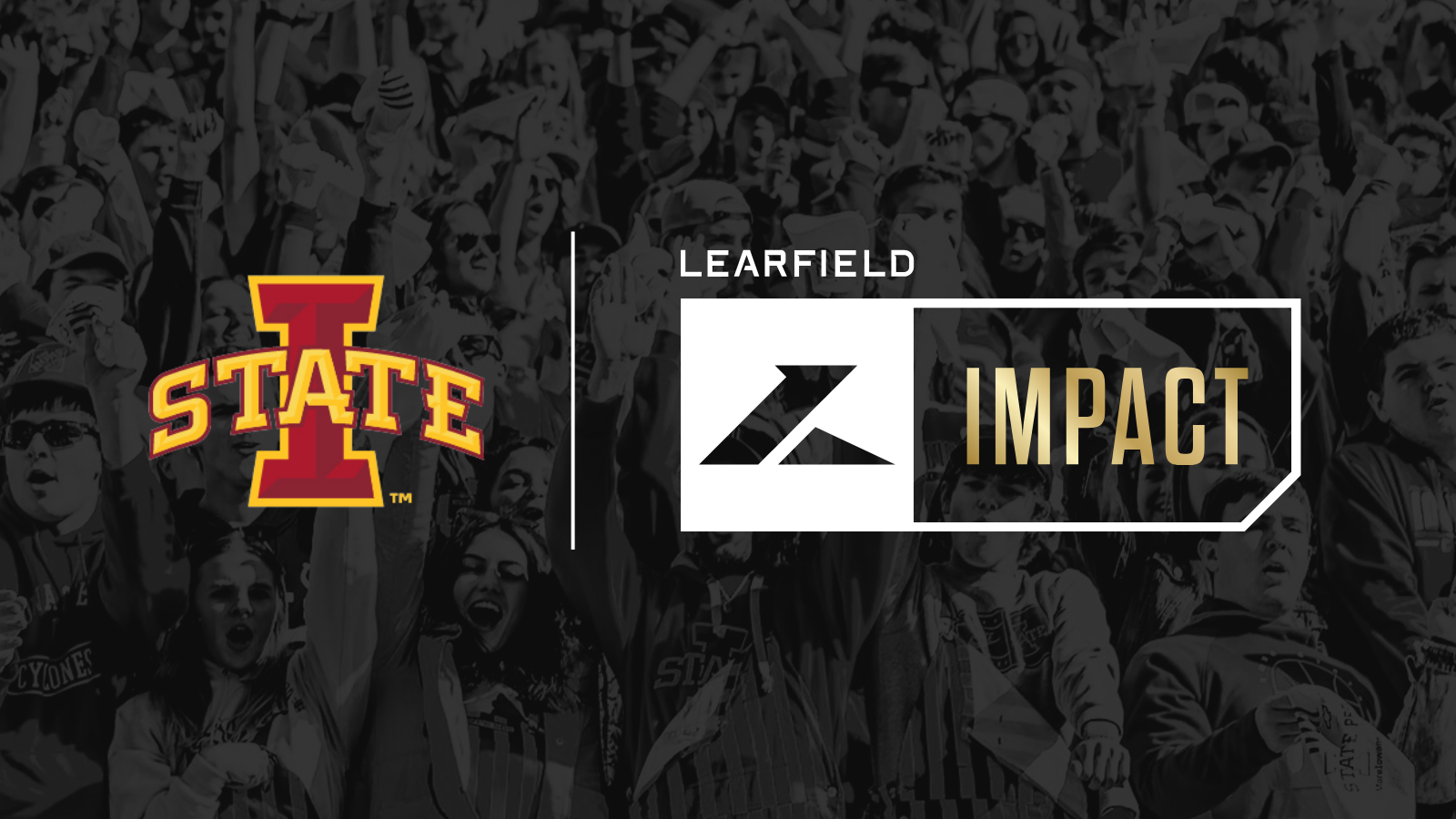
Jake Lovell and MaryKate Walling set to join Learfield Impact NIL team at CSP
AMES, Iowa – Learfield’s Cyclone Sports Properties, in partnership with Iowa State Athletics and Learfield Impact, Learfield’s industry-leading Name, Image and Likeness (NIL) service combining the power of expert people, award-winning content, and innovative technology, has announced the appointment of Brent Blum as the new Director of NIL Development, Jake Lovell as NIL Partnerships and Operations Coordinator and MaryKate Walling as NIL Content Producer.
“We are excited to launch this innovative initiative with Learfield as we navigate this new world intercollegiate athletics enters starting July 1,” ISU Director of Athletics Jamie Pollard said. “We believe that these positions are a continued evolution of our long-standing partnership and allow us to create additional opportunities through existing and new corporate partners.”
Learfield Impact integrates the addition of these three on-campus NIL leadership positions, innovative technology in the form of Learfield’s Compass NIL dealmaking platform, and the Emmy Award-winning Learfield Studios content team into an unmatched full-service NIL offering. This powerful combination seamlessly generates authentic dealmaking and creates opportunities for influential storytelling content between student-athletes and brand partners.
In this newly created role, Blum will help oversee the university’s evolving NIL strategy, working closely with student-athletes, coaches and donors, as well as the Iowa State Foundation and corporate partners to build innovative and sustainable support. His work will focus on aligning the athletic department’s NIL vision with national best practices while staying true to the culture and values of Iowa State.
Blum currently serves as Executive Director of the We Will Collective, where he has helped raise over $12 million in support of Iowa State student-athletes, backed by contributions from more than 10,000 individual donors and area businesses.
“Cyclone Nation’s involvement is as important as ever as we tackle this transition in college athletics,” Blum said. “This next chapter gives us the opportunity to build a more unified and long-term NIL infrastructure for Iowa State. In the short term, continued support of We Will is vital as we move forward.”
Lovell, who has been a member of the CSP staff for three years, will assist Blum in fulfilling NIL sponsorships and Walling, who received both her undergraduate and master’s degrees from Iowa State while working as a content producer for the Cyclone Football program, will produce NIL-related content for CSP sponsors.
With the House settlement approved by Judge Claudia Wilken earlier this month, the Iowa State Athletics Department will now provide direct financial support to Cyclone student-athletes on top of the world-class education and other benefits that they currently receive. Nearly every Cyclone student-athlete will receive a financial payment from the University for their NIL rights beginning on July 1.
Iowa State Athletics will provide the maximum revenue-sharing amount allowed, currently projected to be $20.5M for the 2025-26 fiscal year, by the House settlement to its student-athletes. The We Will Collective will begin transitioning its members to the We Will Fund that will be housed within the ISU Foundation next month. Contributions to the We Will Fund will allow donors to invest in the support of student-athletes while helping ISU ensure future success of its championship-caliber programs.
“The Iowa State fan base has long-been recognized as one of the nation’s most-loyal, and their continued generous support of the We Will Fund will be critical as we move into college athletics’ new era,” Pollard said. “We are grateful for all of our fans who have contributed to the We Will Collective over the last few years and it is our sincere hope they continue that support as we transition to the We Will Fund to ensure that our programs are positioned for greater success in this new era.”
About Learfield
Learfield is the leading media and technology company powering college athletics. Through its digital and physical platforms, Learfield owns and leverages a deep data set and relationships in the industry to drive revenue, growth, brand awareness, and fan engagement for brands, sports, and entertainment properties. With ties to over 1,200 collegiate institutions and over 12,000 local and national brand partners, Learfield’s presence in college sports and live events delivers influence and maximizes reach to target audiences. With solutions for a 365-day, 24/7 fan experience, Learfield enables schools and brands to connect with fans through licensed merchandise, game ticketing, donor identification for athletic programs, exclusive custom content, innovative marketing initiatives, NIL solutions, and advanced digital platforms. Since 2008, it has served as title sponsor for the acclaimed Learfield Directors’ Cup, supporting athletic departments across all divisions.
NIL
‘That’s not normal’: Florida State’s rev-share contracts are raising eyebrows, agents and industry experts say
As college football races toward the start of the revenue-sharing era on July 1, a new battle is unfolding — not on the field, but in the fine print. Schools and player agents are clashing behind the scenes over the language of contracts, with some universities pushing aggressive terms that raise eyebrows across the industry. […]
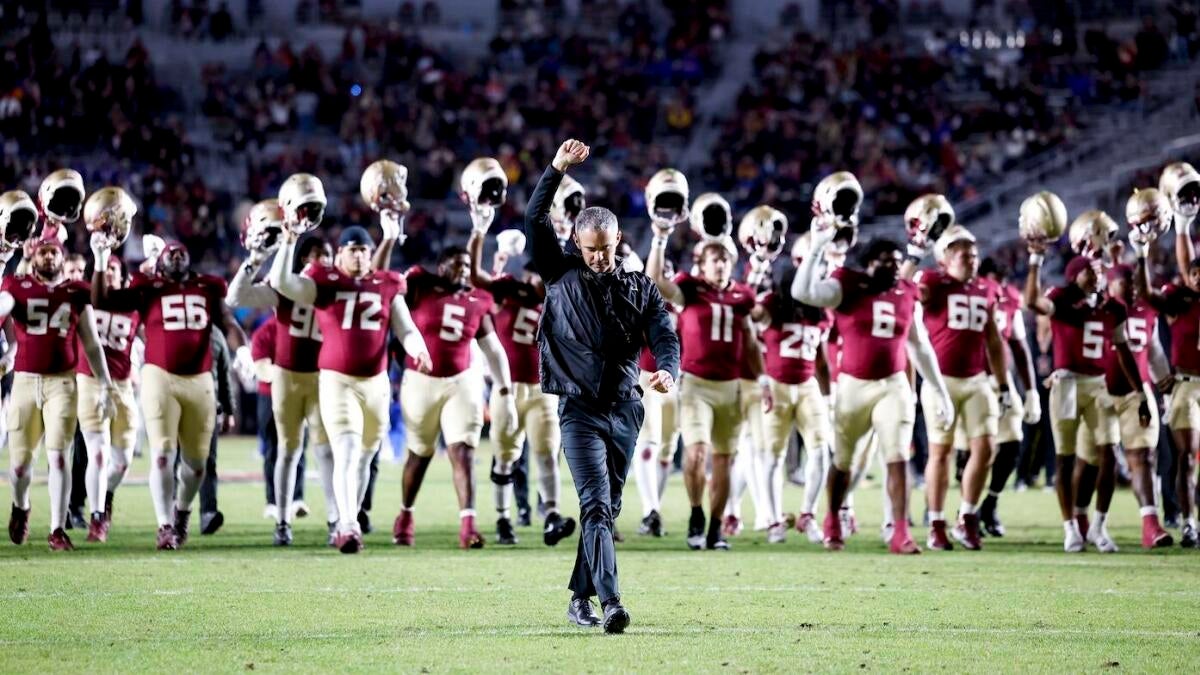
As college football races toward the start of the revenue-sharing era on July 1, a new battle is unfolding — not on the field, but in the fine print. Schools and player agents are clashing behind the scenes over the language of contracts, with some universities pushing aggressive terms that raise eyebrows across the industry.
While some players received front-loaded payments ahead of July 1, many are now encountering multi-page agreements drafted by school lawyers, packed with provisions that attempt to lock in control, minimize financial risk, and, in some cases, limit players’ rights.
“Since this is new and uncharted territory, they’re trying to put in as many things as they can think of and protect that university and see what they get push back on and what they don’t,” Mit Winter, an attorney who works heavily in the NIL space told CBS Sports.
Put another way by an NIL agent: “They’re throwing everything they can and the kitchen sink.”
That sink?
It’s appearing quite often in Tallahassee, according to multiple agent sources who have at least one player on the Florida State roster.
The Seminoles have included what those agents describe as aggressive language in their rev share contracts, which cover a broad range of issues and are issued directly by the school.
One clause, which CBS Sports has seen a copy of, allows the team to extend a player at the end of their contract unilaterally without having to negotiate with the player. Another section on team rules — common in most NIL or rev share deals — includes a maximum $2,500 fine on the first offense if a player loses team equipment such as a pair of cleats. The max fine for using a controlled substance for the first time is $1,000.
There’s another clause about things that would constitute a breach of contract. Among them is “illness or injury which is serious enough to affect the value of rights granted to the school.” The way it’s written allows Florida State to renegotiate or even cancel a player’s contract at its discretion after any sort of injury — among other potential liquidated damages provisions included as part of the contract — including those that happen on the football field.
There’s also a provision that, depending on how it’s interpreted, could limit an athlete’s right to counsel during any future negotiations.
“Some of the concepts are pretty standard,” an agent who represents at least one Florida State player said; they were granted anonymity to allow them to speak freely. “But FSU is going about this far more aggressively than any school I’ve seen. I’m disappointed by the adversarial nature of these contracts.”
It’s not just agents who take exception with the way FSU is attempting to write its rev share contracts. CBS Sports contacted at least one general manager from every Power Four conference to understand if some of Florida State’s provisions are considered normal.
Said one Big Ten general manager of the three stipulations above: “That’s not normal.”
Said a GM from the Big 12: “I do understand they have all the leverage, but f***.”
Still, other agents contacted by CBS Sports said while Florida State is contentious with its reworked rev share agreements, the pushy and controlling language isn’t exactly uncommon.
“I don’t think Florida State is the worst at all in this business,” said an agent with a player on FSU’s roster. “There are schools I trust less.”
Florida State, when reached for comment, offered this statement via a spokesperson in response to questions about some of the provisions CBS Sports highlights in this piece.
“As we enter into a new age of collegiate athletics, Florida State has put together an agreement that provides deliverables and expectations for all parties. Each individual situation will be unique and the hypotheticals are impossible to predict. However, we are committed to continuing to provide an elite experience for our student-athletes in all aspects of their collegiate career. Florida State is looking forward to the mutually beneficial partnerships with our student-athletes in this new era.”
All of this comes at an unstable time in college athletics where schools are attempting to balance what is essentially a pay-for-play model wrapped in the guise of a payment system still built around a school’s access to a player’s name, image and likeness.
That push and pull is something Sports and Higher Education Attorney James Nussbaum, of Church, Church Hittle + Antrim, which consults and works with double-digit D-I programs, said is creating unsteady language in which negotiating agents want things similar to employee protections while schools want as much flexibility as possible if a player’s NIL value tanks due to something like an injury.
“Everybody knows that you have to participate in athletics for your name, image and likeness to be worth anything to the schools you’re going to,” Nussbaum said. “At the same time, we’re trying to continue under this framework where we’re saying this isn’t pay for play.
“Part of why I think it’s difficult to negotiate is because of the framework where we’re not able to compensate you directly for your participation. … There’s a lot of grey area between those two poles.”
Not every Florida State player has been delivered their revenue sharing contract at this point. CBS Sports contacted the agents of several of the top transfer additions for Florida State this offseason — shoe-in starters and borderline top 10 players on the roster — and their money was mostly front-loaded ahead of July 1. They’re expected to see their rev sharing contracts in the coming days.
But a lot of players will have their payout split between the collective dollars and rev share. Some programs allow the terms of their collective contracts to carry over to their rev share deals. Florida State, however, had some players sign a memorandum of understanding, a one-page document that lays out the intended terms between two parties. Others were merely assured their collective deals would carry over into the rev share.
Florida State, like many other programs nationally, was only able to send out the full version of its rev share agreements once the House Settlement was approved on June 6.
In conversations with three agents who represent at least one Florida State player who has been sent their full rev share contract in recent weeks, the Seminoles seem to have settled on a standard contract for its roster. Big Ten and SEC schools generally work off a standardized contract the conference provides to its school. The ACC does not have a contract baseline for its programs.
That lack of universal standard in the ACC has led to some unique language from the Seminoles.
The option to extend
“[school] shall have, until the end of Student-Athlete’s NCAA eligibility, dependent, successive options to extend the Term under the same terms and conditions as the existing Term, unless the Parties mutually agree in writing to a change in such terms and conditions, for additional periods of one year by providing written notice of such extension (e-mail is sufficient) to Student- Athlete no later than twenty (20) days prior to the expiration of the then-current Term of the Agreement. Under such an extension option, the Total Compensation payable to Student-Athlete for the one-year extension period shall be a pro rata, annualized portion of the compensation set for the initial term.
That language, which allows Florida State to extend a student-athlete’s deal pretty much at will by the end of their contract, is considered uncommon when talking with agent and general manger sources across the country.
“That locks a kid in for the rest of his eligibility with no ability to negotiate,” said the agent who shared the contract draft language.
Many schools provide players a window to negotiate after every regular season. Other programs, like in the SEC, have begun writing in a “first right of refusal” clause, which allows them to match a higher offer if they receive one from another school.
But sources CBS Sports spoke to consider Florida State’s extension clause unusually one-sided.
“I’ve never seen that before,” Winter said. “I would say that’s not a usual provision.”
A lot of Florida State players will have multi-year deals as part of the wave of initial revenue sharing contracts, so that language won’t always apply. But it is language that would come up for those on one-year deals or in the future if an athlete reaches the end of their agreed contract length.
A FSU source said players are also able to ask for a renegotiation of terms at the end of a contract if both sides desire an extension. That source indicated the school’s intent is to negotiate in good faith.
Injury and breach of contract
“In addition to a breach of any specific provision of this Agreement, the following circumstances create a breach of contract by Student-Athlete:
1. Illness or Injury Impacting Value of NIL Rights. Student-Athlete experiences any illness or injury which is serious enough to affect the value of the rights granted to [school] under this Agreement; provided, however, that nothing herein shall affect or limit [school]’s obligations to provide Student-Athletes with medical coverage of injuries sustained as a result of participation in [school] Athletics as required by Section 16.4 of the NCAA Division I Bylaws, where applicable.”
A few schools CBS Sports spoke with for this story have language or have considered adding language that allows them to cancel or alter a player’s dollar amount if they suffer an off-field injury doing an unsanctioned activity. Florida State features that language within its rev share contract drafts that it’s sent to players and their representation.
But nobody CBS spoke with considered the way Florida State wrote the above injury provision as normal if the injury occurred in a football context.
“That’s excessive,” said an ACC Director of Player Personnel.
It’s different from the NFL where athletes are employees and there are injury protections for players if they were hurt in organized activities and a stated process for medical second opinions and injury settlements.
And while an agent CBS spoke with expects Florida State to ultimately remove that stipulation from the contract, the way it’s currently written gives FSU full control to adjust a player’s salary when any injury occurs.
“It’s the first time I’ve ever seen something like that with an injury,” another agent said. “The way they’re going about it, they’re having it all in writing where at their discretion they can renegotiate at any time. Guys get injured all the time. The terms are very friendly to them.”
There’s no telling how, or would, Florida State actually enforce the injury provision for breach of contract as written. But those who have seen the contract in the agent space worried that Florida State felt the need to include it in the first place to have that leverage over its athletes.
Team rules
It is common for teams to put program rules in contracts. A SEC GM CBS spoke with said they have a fine system, usually related to things like failed drug tests or weight violations.
A pair of Syracuse freshmen, offensive tackle Byron Washington and defensive back Demetres Samuel Jr., recently revealed on the “State of Orange” podcast the fine structure the Orange use for team violations.
“We get fines for missing more than two absences in class,” Samuel said. “We got class checkers. If you don’t have your jug or your tablet for like …”
Chimed in Washington:”That’s $50.”
Samuel said later in the interview that if players don’t meet weight for a third time in a week it can cost them a quarter of their monthly check.
Florida State has multiple pages of team rules included in their revenue sharing contract. They range from small — a maximum $100 on the first offense for things like tardiness to team events ($50 for academic activities) — to large with a maximum $2,500 reduction in compensation if a player loses any team gear or technology.
The substance abuse fines — be it steroids, marijuana or another substance — scale quickly. The first offense is a maximum of $1,000 reduction from total compensation. The second offense is a maximum 10% of the compensation. A third offense? It’s 50% and a possible dismissal at the head coach’s discretion.
“They’re a bit arbitrary,” an agent said. “One thing I pushed FSU athletics on is this language needs to tie to a policy, right? I have a player in the NFL and his contract has things like showing up to meetings, drug testing but it’s a rigid codified process. The way (FSU’s) policies are written in the contract they could effectively line up three cups, have a kid pee, say it’s a failure and come back in 20 minutes, do it two more times, call it three failures and that penalty for that is his contract value. … And there’s no appeals process.”
That agent also emphasized there’s no functional appeals process for an athlete or burden of proof the team must reach. They said the only recourse an athlete has to challenge a fine is arbitration, where the athlete will likely go up against a school’s general counsel office with infinitely more resources.
A push and pull between schools and agents
Winter had previously come across Florida State’s rev share agreement before talking with CBS Sports. His thought after reading it: “Jesus Christ, this one goes far.”
It’s not uncommon for schools to push the boundaries of what’s considered normal with contracts. Often schools will put many stipulations in deals they’re willing to take out if an agent raises a concern. That has already happened with a few provisions at Florida State, per sources, but many of the above tension points remain and others are set to arise as more of these contracts are sent out.
As for what gets taken out, it can often depend on the leverage a particular athlete has or the importance of the individual clause to the school.
To Nussbaum, this is a period of uncertainty given that schools don’t exactly know how enforcement will play out under the new NIL GO landscape, where schools are attempting to create maximum flexibility. He said it’s up to the school to set priorities for what they deem important within the contracts.
“This is where you really have to have some of these hard conversations with your board and president and say, ‘What are our goals here?'” Nussbaum said. “If it’s simply coming up with the most money we can to compensate these student athletes. That’s one approach. But I don’t think any school is taking that approach.
“Yeah, you’re coming up with something that has some precedential value that’s necessary in a competitive industry like this … I think schools are aware and don’t want to tie themselves down unnecessarily in the future but at the same time want to be competitive and recruit in a way that will set them up for the future.”
And it’s not as if aggressive or controversial language is limited to the rev share era.
CBS spoke to one agent earlier this summer who said one of his clients at another school initially received a contract that allowed a school to terminate for any “alleged” criminal activity with no stipulations for due process. Another school attempted to put in language for damages that if a player left the program before the end of his contract term, he’d need to pay back all money included in the contract, including “unearned money.”
“That’s problematic,” the agent said. “You haven’t made it yet. We understand there’s damages, but a lot of these contracts were back-loaded for when revenue share kicked in.”
Schools are trying to protect themselves from players consistently transferring following a cycle in which more than 4,000 FBS players entered the portal. That’s where aggressive liquidated damages and new buyout language included in many rev share comes from.
But in a sport without an employee-employer relationship or collective bargaining, schools and players are left on an island to negotiate deals, which is where the barrage of restrictive language comes from on the school’s side.
One of the agents CBS spoke to for this story would push back on the idea that’s all Florida State is doing.
While the contested language may end up being removed from the contract its presence, they said, it seems to go beyond a mere negotiating tactic.
“If that were truly their intent, they would write it like that and it’s only useful in cases of emergency,” the agent said. “For example, if they’re only trying to go for a catastrophic injury or when a kid can’t play for the rest of the season, why does the injury clause account for any injury that has an impact on NIL value? They had smart attorneys write these things. They would have written it that way. If you want it for only break glass in case of emergency, you have to put the glass in front of the letter.”
-

 Motorsports2 weeks ago
Motorsports2 weeks agoNASCAR Weekend Preview: Autódromo Hermanos Rodríguez
-

 Motorsports2 weeks ago
Motorsports2 weeks agoNASCAR Through the Gears: Denny Hamlin has gas, a border needs crossing, and yes, that’s a Hemi
-

 NIL3 weeks ago
NIL3 weeks agoShai Gilgeous
-

 Motorsports2 weeks ago
Motorsports2 weeks agoNASCAR Race Today: Mexico City start times, schedule and how to watch live on TV
-

 Health3 weeks ago
Health3 weeks agoNew Era Begins As House Settlement Approved
-
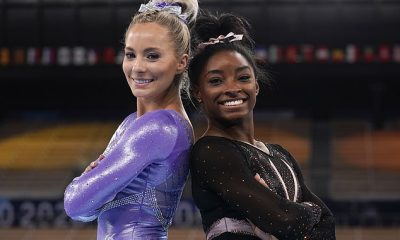
 Health2 weeks ago
Health2 weeks agoGymnast MyKayla Skinner Claims Simone Biles 'Belittled and Ostracized' Her amid Riley …
-

 High School Sports2 weeks ago
High School Sports2 weeks agoHighlights of the Tony Awards
-
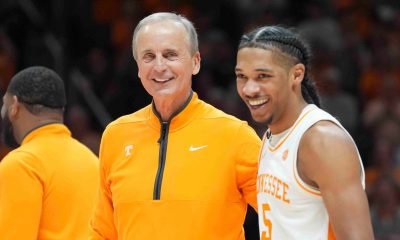
 NIL2 weeks ago
NIL2 weeks agoTennessee law supersedes NCAA eligibility rule
-

 College Sports2 weeks ago
College Sports2 weeks agoFisk to discontinue history-making gymnastics program after 2026 | Area colleges
-

 Sports2 weeks ago
Sports2 weeks agoCoco Gauff, The World's Highest




 Duke Freshman Year Highlights
Duke Freshman Year Highlights  | ESPN College Basketball
| ESPN College Basketball





























